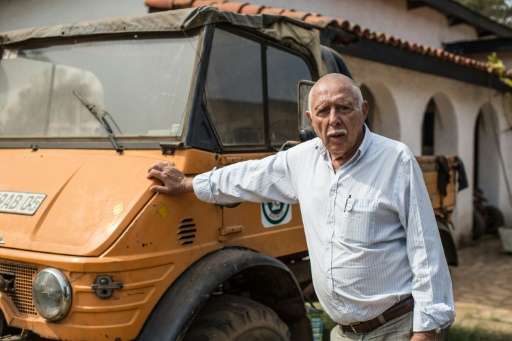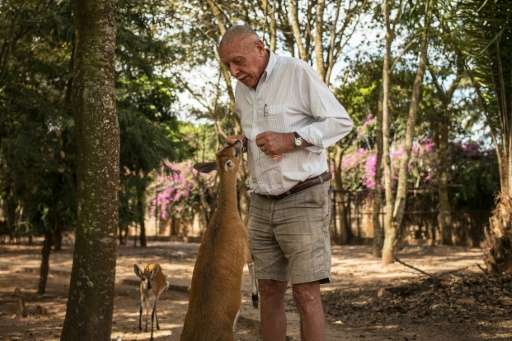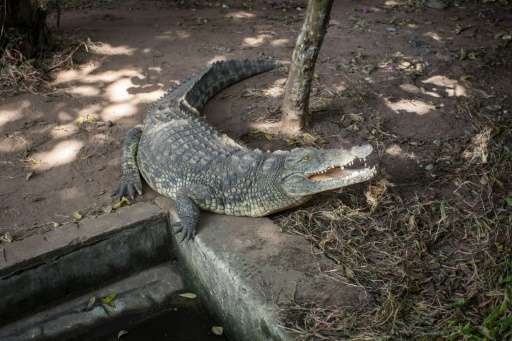At 83, Belgian strives to realise DR Congo wildlife dream

"I was already saying I'd go live in the Congo when I was nine or 10," says Willem Boulanger, who after satisfying that dream is embarking at age 83 on another—founding a game reserve near Kolwezi.
Tall and tough, with a white moustache but only the slightest stoop, the crew-cut settler is full of tales of the dramatic events that have taken place in the Democratic Republic of Congo since he made his home in southeast Katanga province 56 years ago.
Barely installed in his adoptive homeland, Boulanger was swept up in the unrest that followed independence.
He fought alongside Katangese forces trying to secede from the Congo in the 1960s, and in the 1990s witnessed the ethnic troubles that shattered Katanga, in the last years of Mobutu Sese Seko's long reign.
In Bermuda shorts and walking boots, Boulanger laces his tales with humour, recalling how as a boy in the Belgian city of Mons he was captivated as Roman Catholic missionaries recounted their adventures in Africa's exotic heart.
His African exploits began in 1959 when he took a job with the Mining Union of Upper Katanga (UMHK), a Belgian company exploiting the fabulous wealth of the copper belt. By September, he and his wife were setting up house in Kolwezi.
He learned Swahili fast. "You must take an interest (in local people), how to live with them, understand their customs, respect their beliefs," he says.
'I was in heaven!'
He spent his weekends in the bush, sitting by the fire "chatting about everything under the sun" with friendly tribal elders. "I was in heaven!"
But when the Congo won independence from Belgium on June 30, 1960, riots erupted against the nation's former masters, in the capital Kinshasa and elsewhere.
Boulanger was briefly evacuated to Northern Rhodesia (today's Zambia) but was barely back in Katanga when provincial leaders seceded from the newly born nation.
Their State of Katanga was supported by some Belgian politicians and foreign firms keen to keep a hold over the UMHK. Brussels never officially recognised an independent Katanga, but provided assistance and sent troops.

The United Nations urged Belgium to withdraw and sent its own peacekeepers to help the Congolese army.
A former paratroop officer, young Boulanger was tasked by the UMHK with "providing security" by blowing up bridges and fighting with Katanga's army against the UN troops.
Early in 1963, the rebel province's leader Moise Tshombe conceded defeat. "The government soldiers came as conquerors," setting up roadblocks and fleecing locals, Boulanger recalls.
Determined even then to relax at weekends, he founded a water-sports centre near Kolwezi that helped boost the local economy when wealthy Congolese poured in to water-ski.
By way of thanks, Boulanger was made a "mwami", acquiring the status of honorary tribal chief.
In May 1978, Katangese Tiger rebels opposed to Mobutu crossed from Angola to seize Kolwezi at the cost of several hundred civilian lives. "They wanted to take my Peugeot 504, but I had disabled it," Boulanger says.
"They took the Gecamines car," he adds, using the name given to the UMHK once it was nationalised in 1967.
Within days, the French Foreign Legion counter-attacked and claimed the mining town back from the rebels.
Boulanger was evacuated to Belgium but quickly returned—this time without his wife, who wanted nothing more to do with the Congo.

'Blessed land'
"Congo has been a blessed land for me," says Boulanger, who in time had a daughter with a Congolese wife and considers himself "one of the last old dinosaurs" to have stayed.
Parked in front of his home is his old Land Rover, which sports a logo for the Manika wildlife reserve, a pet project for Boulanger's latter years.
With a lease on 16,000 hectares (39,500 acres) of savanna, the white "mwami" plans to bring back a score of mammals that once roamed the region, including leopards, warthogs, giraffes, zebras, gnus and cheetahs.
A visitors' centre was completed in 2010 not far from Kolwezi airport, but much work remains. Boulanger is fencing off a 4,000-hectare part of the reserve with Guy Mukongi, a young businessman who should succeed him one day.
"We need 100,000 dollars" (91,700 euros) to finish the enclosure so the animals can be brought in," says Boulanger.
A small lodge to accommodate tourists had been built beside an artificial pond, but this guesthouse was recently razed in a suspected arson attack. Undaunted, Boulanger plans to start over with fireproof materials.
"We can do anything here," he says, imagining a terrace on stilts in the middle of the little lake where visitors might relax with a drink after a day in the bush.
Fired with enthusiasm, Boulanger even envisages offering guests hot-air balloon trips over the reserve.
© 2015 AFP




















